University History Module: Analysis of Churchill's Historical Speech
VerifiedAdded on 2020/03/28
|5
|1046
|86
Essay
AI Summary
This essay provides an analysis of Churchill's historical speech, focusing on his perspective on the Soviet Union and its expansionist policies. The essay examines Churchill's arguments regarding the threat of communism in Eastern Europe and the world, emphasizing his concerns about the Soviet Union's influence and its impact on democratic values. It explores Churchill's belief in the strength and efficiency of the United States and his call for an alliance between Europe and the United States to ensure peace. The essay also highlights Churchill's views on the importance of a strong military force and national unity in times of crisis. Furthermore, the essay delves into why Churchill chose the United States as the platform for his speech, analyzing his ability to see both sides of an argument and his desire to make people aware of the Cold War and its potential outcomes. The essay references supporting materials to bolster the arguments presented.
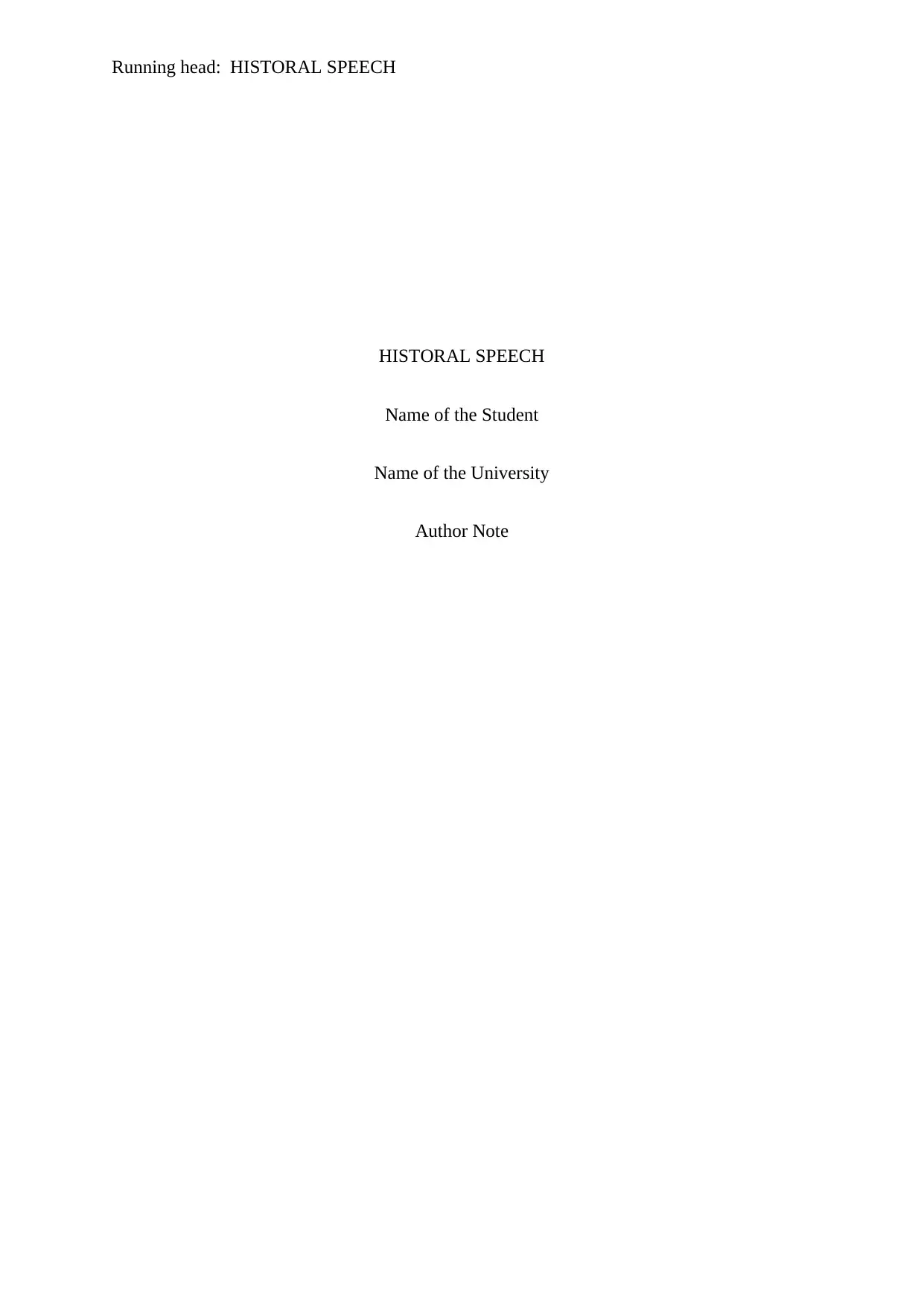
Running head: HISTORAL SPEECH
HISTORAL SPEECH
Name of the Student
Name of the University
Author Note
HISTORAL SPEECH
Name of the Student
Name of the University
Author Note
Paraphrase This Document
Need a fresh take? Get an instant paraphrase of this document with our AI Paraphraser
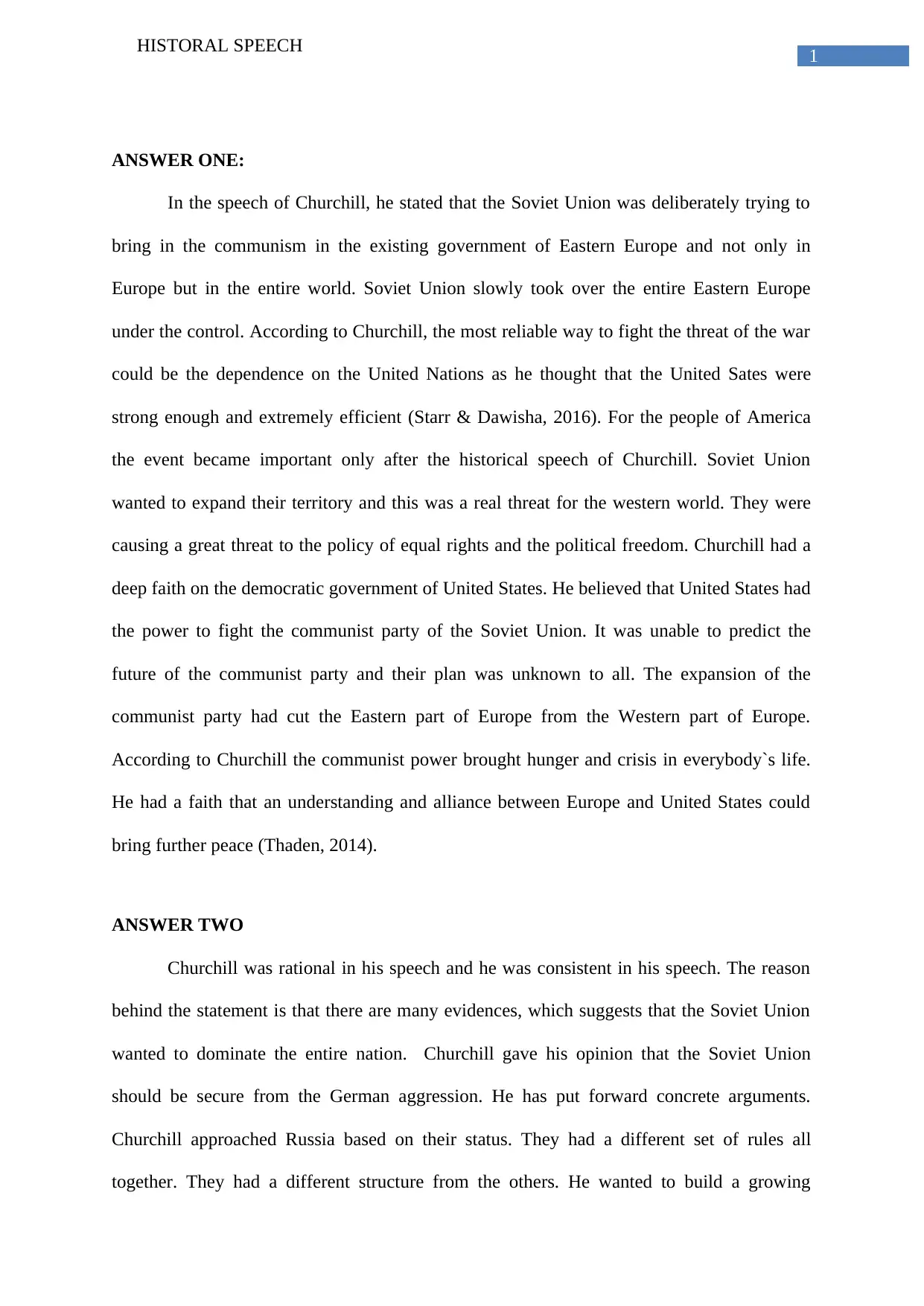
1
HISTORAL SPEECH
ANSWER ONE:
In the speech of Churchill, he stated that the Soviet Union was deliberately trying to
bring in the communism in the existing government of Eastern Europe and not only in
Europe but in the entire world. Soviet Union slowly took over the entire Eastern Europe
under the control. According to Churchill, the most reliable way to fight the threat of the war
could be the dependence on the United Nations as he thought that the United Sates were
strong enough and extremely efficient (Starr & Dawisha, 2016). For the people of America
the event became important only after the historical speech of Churchill. Soviet Union
wanted to expand their territory and this was a real threat for the western world. They were
causing a great threat to the policy of equal rights and the political freedom. Churchill had a
deep faith on the democratic government of United States. He believed that United States had
the power to fight the communist party of the Soviet Union. It was unable to predict the
future of the communist party and their plan was unknown to all. The expansion of the
communist party had cut the Eastern part of Europe from the Western part of Europe.
According to Churchill the communist power brought hunger and crisis in everybody`s life.
He had a faith that an understanding and alliance between Europe and United States could
bring further peace (Thaden, 2014).
ANSWER TWO
Churchill was rational in his speech and he was consistent in his speech. The reason
behind the statement is that there are many evidences, which suggests that the Soviet Union
wanted to dominate the entire nation. Churchill gave his opinion that the Soviet Union
should be secure from the German aggression. He has put forward concrete arguments.
Churchill approached Russia based on their status. They had a different set of rules all
together. They had a different structure from the others. He wanted to build a growing
HISTORAL SPEECH
ANSWER ONE:
In the speech of Churchill, he stated that the Soviet Union was deliberately trying to
bring in the communism in the existing government of Eastern Europe and not only in
Europe but in the entire world. Soviet Union slowly took over the entire Eastern Europe
under the control. According to Churchill, the most reliable way to fight the threat of the war
could be the dependence on the United Nations as he thought that the United Sates were
strong enough and extremely efficient (Starr & Dawisha, 2016). For the people of America
the event became important only after the historical speech of Churchill. Soviet Union
wanted to expand their territory and this was a real threat for the western world. They were
causing a great threat to the policy of equal rights and the political freedom. Churchill had a
deep faith on the democratic government of United States. He believed that United States had
the power to fight the communist party of the Soviet Union. It was unable to predict the
future of the communist party and their plan was unknown to all. The expansion of the
communist party had cut the Eastern part of Europe from the Western part of Europe.
According to Churchill the communist power brought hunger and crisis in everybody`s life.
He had a faith that an understanding and alliance between Europe and United States could
bring further peace (Thaden, 2014).
ANSWER TWO
Churchill was rational in his speech and he was consistent in his speech. The reason
behind the statement is that there are many evidences, which suggests that the Soviet Union
wanted to dominate the entire nation. Churchill gave his opinion that the Soviet Union
should be secure from the German aggression. He has put forward concrete arguments.
Churchill approached Russia based on their status. They had a different set of rules all
together. They had a different structure from the others. He wanted to build a growing
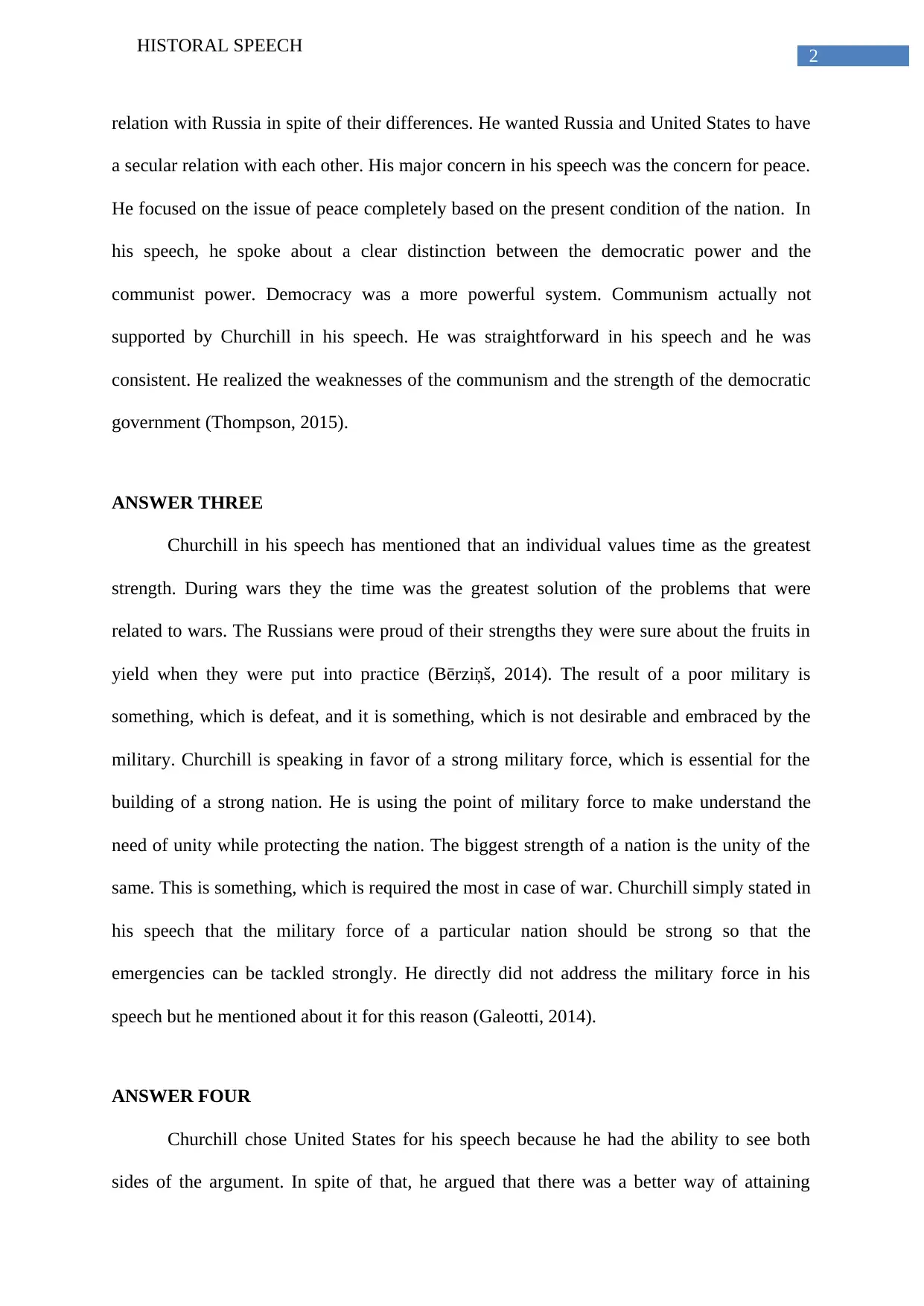
2
HISTORAL SPEECH
relation with Russia in spite of their differences. He wanted Russia and United States to have
a secular relation with each other. His major concern in his speech was the concern for peace.
He focused on the issue of peace completely based on the present condition of the nation. In
his speech, he spoke about a clear distinction between the democratic power and the
communist power. Democracy was a more powerful system. Communism actually not
supported by Churchill in his speech. He was straightforward in his speech and he was
consistent. He realized the weaknesses of the communism and the strength of the democratic
government (Thompson, 2015).
ANSWER THREE
Churchill in his speech has mentioned that an individual values time as the greatest
strength. During wars they the time was the greatest solution of the problems that were
related to wars. The Russians were proud of their strengths they were sure about the fruits in
yield when they were put into practice (Bērziņš, 2014). The result of a poor military is
something, which is defeat, and it is something, which is not desirable and embraced by the
military. Churchill is speaking in favor of a strong military force, which is essential for the
building of a strong nation. He is using the point of military force to make understand the
need of unity while protecting the nation. The biggest strength of a nation is the unity of the
same. This is something, which is required the most in case of war. Churchill simply stated in
his speech that the military force of a particular nation should be strong so that the
emergencies can be tackled strongly. He directly did not address the military force in his
speech but he mentioned about it for this reason (Galeotti, 2014).
ANSWER FOUR
Churchill chose United States for his speech because he had the ability to see both
sides of the argument. In spite of that, he argued that there was a better way of attaining
HISTORAL SPEECH
relation with Russia in spite of their differences. He wanted Russia and United States to have
a secular relation with each other. His major concern in his speech was the concern for peace.
He focused on the issue of peace completely based on the present condition of the nation. In
his speech, he spoke about a clear distinction between the democratic power and the
communist power. Democracy was a more powerful system. Communism actually not
supported by Churchill in his speech. He was straightforward in his speech and he was
consistent. He realized the weaknesses of the communism and the strength of the democratic
government (Thompson, 2015).
ANSWER THREE
Churchill in his speech has mentioned that an individual values time as the greatest
strength. During wars they the time was the greatest solution of the problems that were
related to wars. The Russians were proud of their strengths they were sure about the fruits in
yield when they were put into practice (Bērziņš, 2014). The result of a poor military is
something, which is defeat, and it is something, which is not desirable and embraced by the
military. Churchill is speaking in favor of a strong military force, which is essential for the
building of a strong nation. He is using the point of military force to make understand the
need of unity while protecting the nation. The biggest strength of a nation is the unity of the
same. This is something, which is required the most in case of war. Churchill simply stated in
his speech that the military force of a particular nation should be strong so that the
emergencies can be tackled strongly. He directly did not address the military force in his
speech but he mentioned about it for this reason (Galeotti, 2014).
ANSWER FOUR
Churchill chose United States for his speech because he had the ability to see both
sides of the argument. In spite of that, he argued that there was a better way of attaining
⊘ This is a preview!⊘
Do you want full access?
Subscribe today to unlock all pages.

Trusted by 1+ million students worldwide
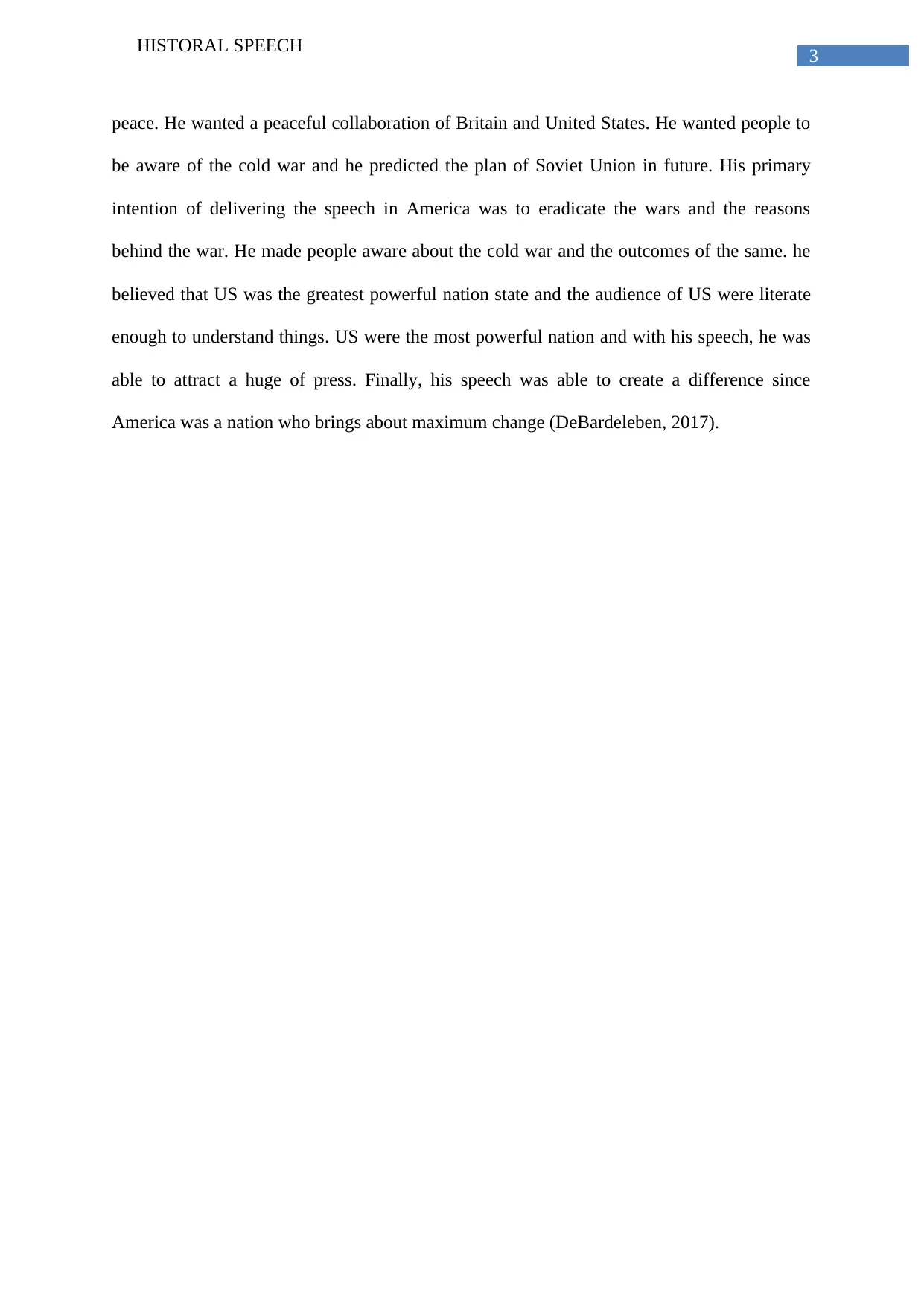
3
HISTORAL SPEECH
peace. He wanted a peaceful collaboration of Britain and United States. He wanted people to
be aware of the cold war and he predicted the plan of Soviet Union in future. His primary
intention of delivering the speech in America was to eradicate the wars and the reasons
behind the war. He made people aware about the cold war and the outcomes of the same. he
believed that US was the greatest powerful nation state and the audience of US were literate
enough to understand things. US were the most powerful nation and with his speech, he was
able to attract a huge of press. Finally, his speech was able to create a difference since
America was a nation who brings about maximum change (DeBardeleben, 2017).
HISTORAL SPEECH
peace. He wanted a peaceful collaboration of Britain and United States. He wanted people to
be aware of the cold war and he predicted the plan of Soviet Union in future. His primary
intention of delivering the speech in America was to eradicate the wars and the reasons
behind the war. He made people aware about the cold war and the outcomes of the same. he
believed that US was the greatest powerful nation state and the audience of US were literate
enough to understand things. US were the most powerful nation and with his speech, he was
able to attract a huge of press. Finally, his speech was able to create a difference since
America was a nation who brings about maximum change (DeBardeleben, 2017).
Paraphrase This Document
Need a fresh take? Get an instant paraphrase of this document with our AI Paraphraser
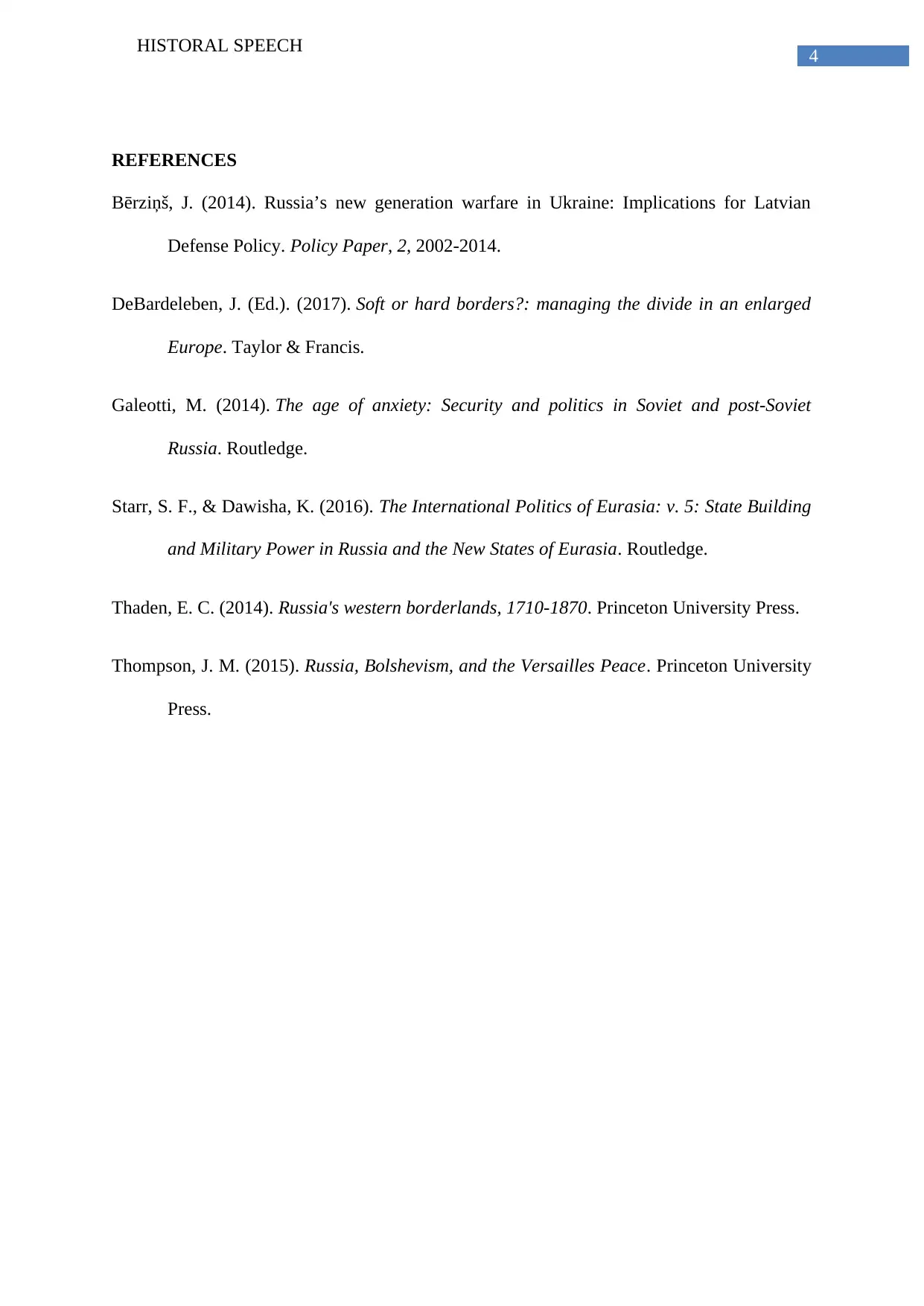
4
HISTORAL SPEECH
REFERENCES
Bērziņš, J. (2014). Russia’s new generation warfare in Ukraine: Implications for Latvian
Defense Policy. Policy Paper, 2, 2002-2014.
DeBardeleben, J. (Ed.). (2017). Soft or hard borders?: managing the divide in an enlarged
Europe. Taylor & Francis.
Galeotti, M. (2014). The age of anxiety: Security and politics in Soviet and post-Soviet
Russia. Routledge.
Starr, S. F., & Dawisha, K. (2016). The International Politics of Eurasia: v. 5: State Building
and Military Power in Russia and the New States of Eurasia. Routledge.
Thaden, E. C. (2014). Russia's western borderlands, 1710-1870. Princeton University Press.
Thompson, J. M. (2015). Russia, Bolshevism, and the Versailles Peace. Princeton University
Press.
HISTORAL SPEECH
REFERENCES
Bērziņš, J. (2014). Russia’s new generation warfare in Ukraine: Implications for Latvian
Defense Policy. Policy Paper, 2, 2002-2014.
DeBardeleben, J. (Ed.). (2017). Soft or hard borders?: managing the divide in an enlarged
Europe. Taylor & Francis.
Galeotti, M. (2014). The age of anxiety: Security and politics in Soviet and post-Soviet
Russia. Routledge.
Starr, S. F., & Dawisha, K. (2016). The International Politics of Eurasia: v. 5: State Building
and Military Power in Russia and the New States of Eurasia. Routledge.
Thaden, E. C. (2014). Russia's western borderlands, 1710-1870. Princeton University Press.
Thompson, J. M. (2015). Russia, Bolshevism, and the Versailles Peace. Princeton University
Press.
1 out of 5
Related Documents
Your All-in-One AI-Powered Toolkit for Academic Success.
+13062052269
info@desklib.com
Available 24*7 on WhatsApp / Email
![[object Object]](/_next/static/media/star-bottom.7253800d.svg)
Unlock your academic potential
Copyright © 2020–2025 A2Z Services. All Rights Reserved. Developed and managed by ZUCOL.





